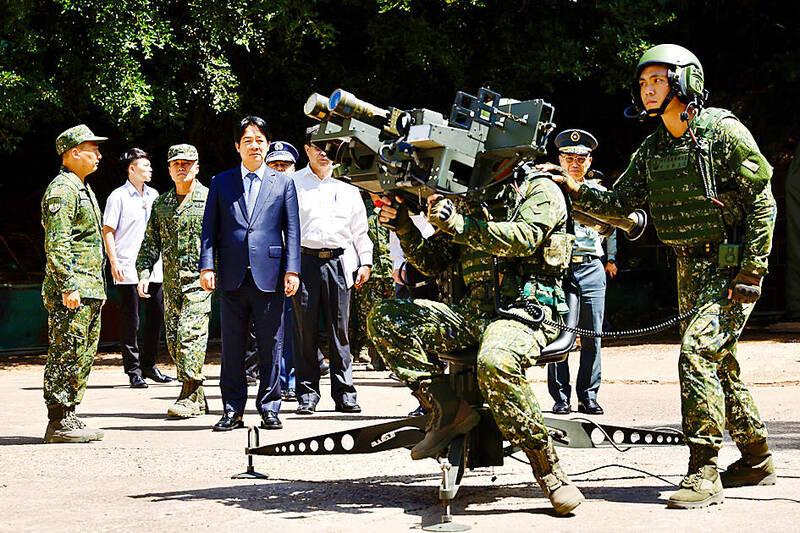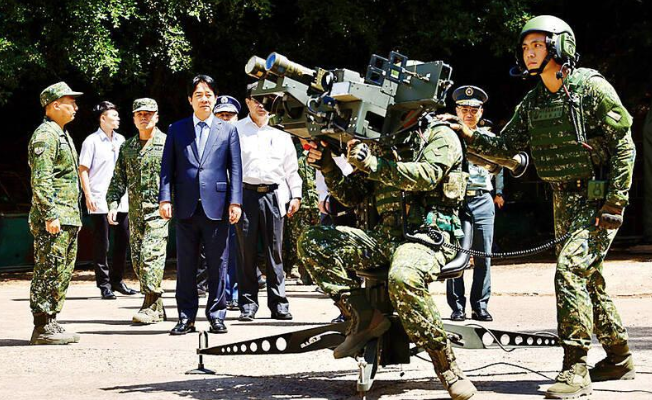RESILIENCE: China has employed a whole-of-government approach including military, diplomatic and economic measures to pressure and coerce Taiwan, an AIT official said
Staff writer, with CNA
The US “strongly encourages and applauds” the efforts made by President William Lai’s (賴清德) administration to bolster Taiwan’s self-defense through reforms and investments, said Ingrid Larson, managing director of the American Institute in Taiwan’s (AIT) Washington Office.
Larson made the remarks on Monday when introducing Vice Minister of National Defense Hsu Yen-pu (徐衍璞) as the keynote speaker at this year’s US-Taiwan Defense Industry Conference in Philadelphia.
In her speech, Larson said that throughout the past year, Beijing has continued to employ a whole-of-government approach using a range of diplomatic, informational, military, financial, intelligence, law enforcement and economic measures to pressure and coerce Taiwan.

President William William Lai, third left, views a Stinger multiple missile launcher demonstration by soldiers during his visit inside an army base in Penghu County on September 6.
Photo: Ritchie B. Tongo, EPA-EFE
One example she raised is how the Scottish city of Edinburgh ended plans for a sister city relationship with Kaohsiung due to Chinese pressure.
“Such actions are not conducive to promoting people-to-people ties, or the peaceful resolution of cross-strait differences,” she added.
The US “strongly encourages and applauds the Lai administration’s early efforts to continue to bolster Taiwan’s self-defense through reforms and resource investments,” such as the proposal to increase Taiwan’s defense budget for next year by nearly 6 percent to about US$20 billion, she said.
The US also welcomes Minister of National Defense Wellington Koo’s (顧立雄) support for significant defense reforms, including the establishment of a new entity within the defense ministry modeled after the US’ Defense Innovation Unit, she said.
On the topic of the Lai administration’s Whole-of-Society Defense Resilience Committee — which brings together government officials, representatives from the private sector and civil society groups to promote society-wide involvement in national defense — Larson said: “We support his approach.”
While the US remains committed to enabling Taiwan to maintain sufficient self-defense capability, she said that maintaining peace and stability goes beyond conventional defense, and should also include the enhancement of Taiwan’s whole-of-society resilience to ensure it is resilient, secure and interconnected within the global community and the global economy.
“This means strengthening the US-Taiwan unofficial relationship, raising global awareness of the importance of peace and stability in the Taiwan Strait, expanding Taiwan’s international space and bolstering Taiwan’s economic diplomacy,” she added.
A major focus of the US government has been to bolster Taiwan’s whole-of-society resilience, an effort that spans critical infrastructure protection, humanitarian assistance and disaster relief capabilities, cyberdefense, food security, economic interdependence, energy resilience and financial connectivity, she said.
Deepening ties with the private sector can also help maintain peace and stability in the Taiwan Strait, she added.
Speaking to US business representatives, she said: “When US businesses like you pursue opportunities with Taiwan, you are helping to realize a Taiwan that is more integrated and not isolated, more resilient and less vulnerable to coercion.”
The US’ commercial interest is to deepen economic ties with Taiwan — its eighth-largest trade partner, she added.
With initiatives such as the CHIPS and Science Act, the US welcomes cutting-edge semiconductor manufacturers from Taiwan to come to the US and build chip ecosystems, she said.
US President Joe Biden’s administration is working with the US Congress to reduce the tax burden on US firms in Taiwan and Taiwanese companies in the US, she added.



